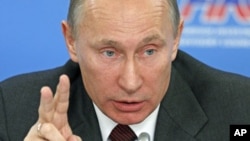Russia is scheduled to hold parliamentary elections on December 4 and presidential elections on March 4. Prime Minister Vladimir Putin went on national television Monday to explain why Russians should vote for the ruling United Russia party and elect him as the country's next president.
Putin defended his bid for a third term in the Kremlin, arguing that Russia is still a fragile state 20 years after the collapse of the Soviet Union.
In a rare admission of Russia’s weakness, Putin told three interviewers from state-controlled stations that “[e]verything here is tacked together, both in politics and in the economy.”
Last month, the Russian prime minister and President Dmitry Medvedev unveiled a plan to swap jobs next year. The plan depends on Medvedev leading the ruling United Russia party to victory in parliamentary elections seven weeks from now. Then, Putin, Russia’s most popular politician, would win presidential elections in March.
This would allow Putin to lead Russia for as long as 24 years - longer than the 17 years Leonid Brezhnev ruled the Soviet Union. Cartoons have appeared in the Russian press, showing an aging Vladimir Putin wearing a Brezhnev-style uniform adorned with medals.
Putin told Russian TV, “They say that the stagnation of the Brezhnev times will be back soon." But the prime minister said that he and Medvedev are smarter and have worked harder than leaders during the Soviet era.
Asked why many people in the West sees him as a hard-line leader, Putin said he was against “these cliches.”
The prime minister called for a balanced foreign policy and "friendly relations" with Russia's partners. But he warned Russian viewers, “It would be a great mistake for us to try to pull on the robes of some kind of superpower and to try to dictate our demands.”
Overall, Putin promised voters that there would be “no abrupt changes” in Russian policies.
With political competition limited and television heavily tilted toward the ruling party, December's parliamentary elections have generated little public interest in Russia. President Medvedev, who heads the candidate list of the United Russia party, is scheduled to be out of the country during much of November. Analysts say this could be a sign that he might not play a key role in the election campaign.
Earlier Monday, Prime Minister Putin made his first comment on the economic protests sweeping many Western capitals. Addressing executives of foreign multinational companies gathered in Moscow, he said "[h]undreds of thousands of people - not just a bunch of outcasts, but hundreds of thousands - are coming out onto the streets to demand what their governments are unable to fulfill."
The solution, he said, was to increase social spending to help reduce income inequalities. Kremlin budget figures show that social spending in Russia next year increasing by 20 percent.
Putin Promises Stability if Elected Russia's President
- By James Brooke




